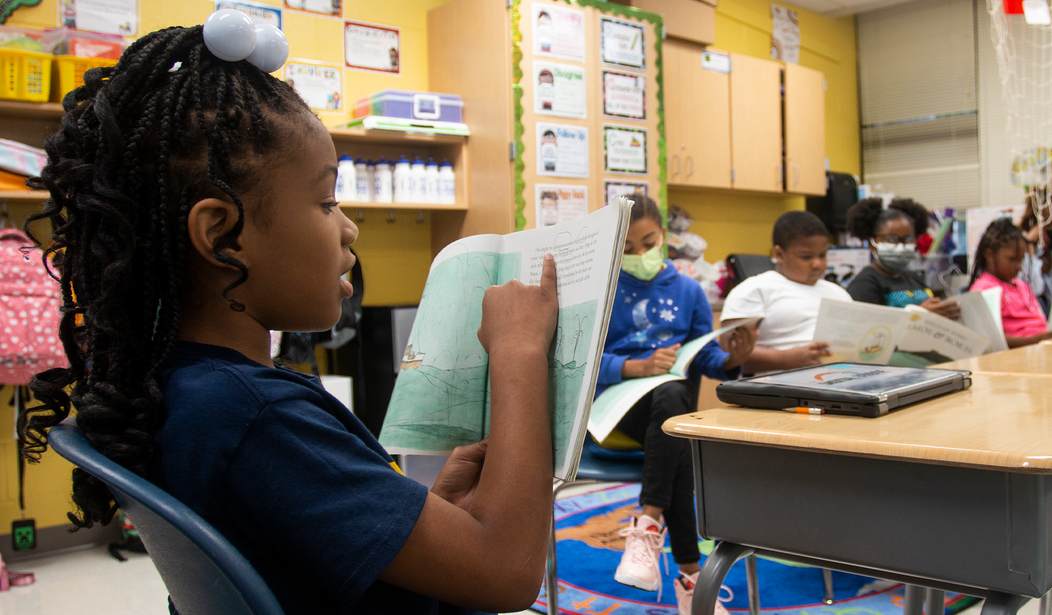A study released today showed schools which trained teachers on the so-called science of reading (which features phonics) helped raise test scores in poorly performing schools.
The program in about 70 low-performing schools yielded test-score gains for third graders in 2022 and 2023, on par with students having attended school for an additional quarter of a year in English and 12 percent of a year in math, according to a working paper by researchers at the Stanford University Graduate School of Education.
For about $1,000 per student annually, the program retrained teachers and administrators and paid for new classroom materials, better aligned to cognitive research.
The study, by Sarah Novicoff, a Stanford graduate student, and Thomas S. Dee, a professor of education, compared schools that participated in the program to a similar set of schools that did not. It has not yet been peer reviewed.
This is good news after years dominated by pandemic learning loss and a lingering absenteeism crisis. At last there might be something which could help make up for lost time. The study hasn’t been peer reviewed but the general findings favorable to phonics aren’t new. I’ve written before about how California got here. Being the progressive state that it is, California jumped on the bandwagon of the hot new trend in reading, adopting a style of teaching called “whole language” in the 1980s.
In the 1970s and 1980s, the Dick-and-Jane method was replaced by the whole-language approach, which was vaguely associated with the left. The theory was, essentially, that if you surround children with high-quality, engaging children’s literature, they will acquire the ability to read. The approach proved wildly popular with teachers, but the movement encountered a serious obstacle in the 1990s when reading scores in California—which had adopted whole language statewide—took a serious plunge…
Advocates of whole language—and its wildly popular successor, balanced literacy—are generally opposed to direct, explicit instruction. They say students need the freedom to learn in various ways and teachers need the freedom to teach as they believe best. That orientation has led many to see phonics as a regimented, one-size-fits-all prescription that prevents children from developing a love of reading.
Phonics made a comeback in California by 1995 and California stayed at the forefront of phonics for nearly a decade. But many teachers didn’t like it, feeling it was too regimented. They pushed to get rid of it. However, once they saw the results of ditching phonics, teachers changed their minds and tried to bring phonics back.
As a teacher in Oakland, Calif., Kareem Weaver helped struggling fourth- and fifth-grade kids learn to read by using a very structured, phonics-based reading curriculum called Open Court. It worked for the students, but not so much for the teachers. “For seven years in a row, Oakland was the fastest-gaining urban district in California for reading,” recalls Weaver. “And we hated it.”
The teachers felt like curriculum robots—and pushed back. “This seems dehumanizing, this is colonizing, this is the man telling us what to do,” says Weaver, describing their response to the approach. “So we fought tooth and nail as a teacher group to throw that out.” It was replaced in 2015 by a curriculum that emphasized rich literary experiences. “Those who wanted to fight for social justice, they figured that this new progressive way of teaching reading was the way,” he says.
Now Weaver is heading up a campaign to get his old school district to reinstate many of the methods that teachers resisted so strongly: specifically, systematic and consistent instruction in phonemic awareness and phonics. “In Oakland, when you have 19% of Black kids reading—that can’t be maintained in the society,” says Weaver, who received an early and vivid lesson in the value of literacy in 1984 after his cousin got out of prison and told him the other inmates stopped harassing him when they realized he could read their mail to them. “It has been an unmitigated disaster.”
Starting a decade ago, several states passed laws which require teaching phonics. Mississippi was one of the first states to do this back in 2013 and the results were dramatic.
In 2013, the Mississippi Legislature passed the Literacy-Based Promotion Act, which, among other things, set aside funding to educate teachers in the science of reading. Six years later, the heavily Black southern state posted the highest gains in reading proficiency in the nation — 10 percentage points over the previous year.
Now left-leaning places like New York City and Portland, Oregon are adopting phonics as well. So we’re in a fairly good place at the moment but for some reason it seems this debate never really ends. Phonics may work but it doesn’t seem to be as enjoyable to teach and that means every few years progressive teachers find an excuse to try something new which inevitably doesn’t work as well. Advocates for whole language and its offshoots are sort of like the “real communism has never been tried” people. No matter how many times the alternatives to phonics fail, some folks are always eager to run the experiment again.








Join the conversation as a VIP Member